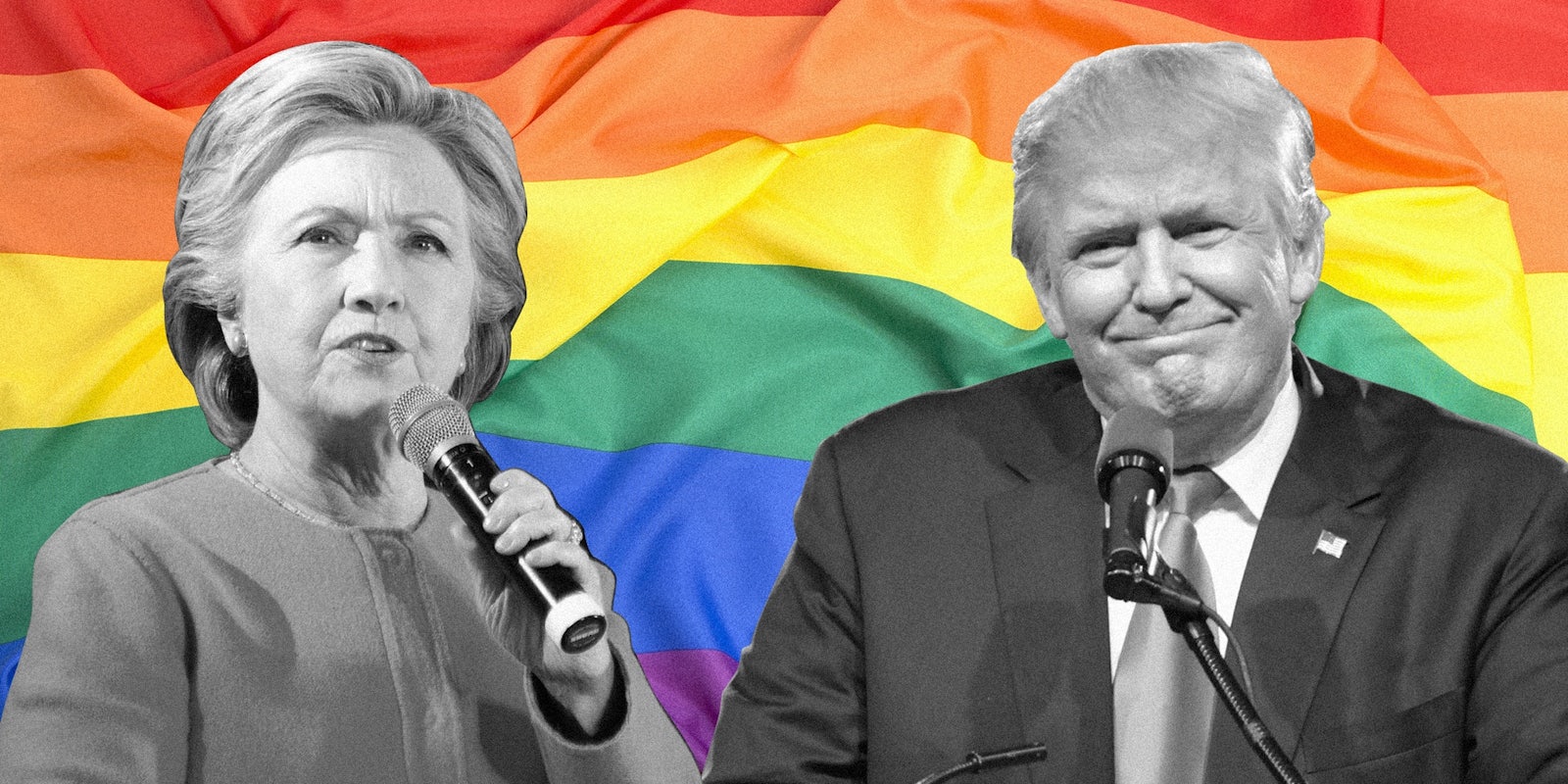Well, folks, it’s finally here. After the most grueling year and half of campaigning, e-mail scandals, strange celebrity endorsements, ‘SNL’ sketches, “Make America Great Again” iterations, racist tweets, and birds on speech podiums, today is finally the day to elect the 45th president of the United States. Though the dramatic attack ads and debates will finally end, a new era will begin when the president, his or her cabinet, and all our elected officials work toward reshaping domestic and international policy.
While a Trump administration will differ vastly from a Clinton one in most regards, the LGBTQ population in particular can expect to be hugely affected by how the two candidates and their running mates intend to preserve civil liberties for the community. To clarify where they stand, here are the candidates’ positions on five topics affecting LGBTQ Americans.
Marriage Equality
It’s no secret that Hillary Clinton previously opposed sex-same marriage and once stated, “I think a marriage is as a marriage has always been, between a man and a woman.” In 2013, she flipped her stance in what some called genuine evolution of thought and others believed to be political opportunism. Regardless, she has vowed to uphold the decision made in the Supreme Court Case of Obergefell v. Hodges and extend LGBTQ rights beyond just marriage equality.
Donald Trump has publicly opposed marriage equality since 2000. In an interview with Fox News last year, Trump said he would “strongly consider” appointing justices that would overrule marriage equality if elected. Trump’s running mate, Mike Pence, voted “yes” to defining marriage as one-man-one-woman in 2006, making the duo an unfriendly choice for LGBTQ people who want to protect their right to marry.
Bathroom Access
Transgender bathroom access became a talking point for politicians during this election cycle after North Carolina passed House Bill 2 (HB2), requiring people to use bathrooms aligning with their assigned-at-birth sex. Shortly after, the Obama administration instituted transgender bathroom guidelines, which would have allowed trans students across the country to use bathrooms that correspond with their gender identity—until a federal judge blocked those too.
Though Clinton did not explicitly address the issue of bathroom access, her spokesperson Xochitl Hinojosa told the Washington Post that Clinton stood with the Obama administration on its actions to “stand up for the rights of LGBT people—and particularly for the rights of transgender people—across the country.” Her running mate, Tim Kaine, has condemned HB2 and likened it with Senate Bill 101, which Mike Pence signed into law during his time as governor of Indiana. The bill allowed business owners to refuse service to anyone offending their religious beliefs, specifically targeting LGBTQ people.
In April, Trump said bathroom laws should be left up to states and North Carolina should not have passed HB2. He also mentioned Caitlyn Jenner could use whichever bathroom she chose in the Trump Tower. In July, howeve, he changed his comments and said he agreed with the North Carolina law.
Workplace Discrimination
In 2015, Clinton pledged to sign the Employment Non-Discrimination Act, which prohibits employment and hiring discrimination on the basis of sexual orientation and gender identity. This is the same law Pence voted against in 2007 on the basis that it would wage “war on freedom and religion in the workplace.” Clinton also endorsed the Equality Act, which aimed “to protect LGBT people nationwide from discrimination in credit, education, employment, housing, federal financial assistance, jury service and public accommodations.”
Meanwhile, Trump has vowed to sign the First Amendment Defense Act (FADA), which would legalize discrimination against LGBTQ people among employers, landlords, businesses, and even healthcare providers, as long as they cite their reasoning to be rooted in religious beliefs.
Hate Crimes
Clinton co-sponsored the Local Law Enforcement Hate Crime Prevention Act, which sought to provide federal assistance to state and local authorities in prosecuting hate crimes, including offenses based on sexual orientation and gender identity. Back in 2000, Trump also suggested that hate crime legislation should include LGBTQ individuals. However, his VP pick has refused to support LGBTQ-inclusive hate crime laws, complaining that such measures would have “a chilling effect on religious expression, from the pulpits, in our temples, in our mosques, and in our churches.”
Conversion Therapy
Put simply, conversion therapy is a pseudo-therapy that encourages LGB individuals to change their sexual orientation from gay to straight. A few states have banned conversion therapy, but an overwhelming 45 states still don’t have laws addressing this dangerous practice.
Last year, Clinton tweeted that it’s time to put an end to conversion therapy for minors, whereas Pence has encouraged directing resources to “institutions which provide assistance to those seeking to change their sexual behavior.” Trump has not issued remarks on conversion therapy.
Take all of this information in, exhale, and remember to get out there and vote today. These issues and many more depend on it.


